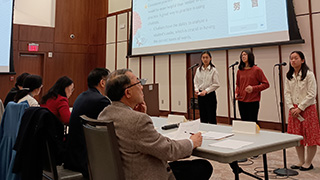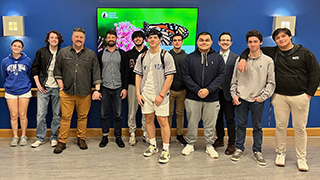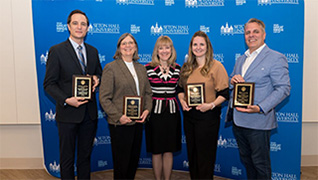Watch Out for the Shiny New Ones
Tuesday, April 9, 2024

Matthew Hale, Ph.D.
Matthew Hale, Ph.D., associate professor in the Department of Political Science and Public Affairs does not toy with readers in his guest column for NJ.com/Star-Ledger’s opinion section with a policy analysis of the ins-and-outs of New Jersey political parties, gridlock, elections and the infamous county line. Reminiscing on the themes of the classic Toy Story movies, he asks New Jerseyans not to forget what we loved about our old toys as we reach for shiny new ones.
He points to the implications of the preliminary injunction by U.S. District Judge Zahid Quraishi against New Jersey’s county line on the election ballot, and discusses the consequences of such a change on the state’s political parties.
He writes, "New Jersey’s political parties are like Toy Story’s Green Army Men, (which is apt since they are mainly run by men). They are a steady, collective group of people each doing a small part to reach a common objective," adding, "Washington and perhaps what comes next in New Jersey is like Buzz Lightyear: a loud a flashy rocket prone to pontificating while blasting off from the left to the right."
Hale reflects on how our state politics are special, not because of how the ballots are constructed, but because of how its political parties remain powerful, effective and help make our state and local governments work.
He explains that parties are an important signaling mechanism for voters who may not know much about individual candidates, but that parties play a central role in retail politics in New Jersey and in moderating extremes on both ends of the political spectrum.
Says Hale:
Retail politics is the nuts-and-bolts field work of political campaigns. It is thinks like running phone banks, getting vote-by-mail ballots in and out, and knocking on doors. In New Jersey, the county parties play a central role in running these retail operations because they are doing it for an entire slate of county line candidates. In addition, parties have county committee members elected at the neighborhood level. They know what Mrs. Mitnick over on 8th Ave. thinks and wants from her party and government. That helps.
The death of the line may not kill this kind of ultra-local retail campaigning in New Jersey. But in most states, with weaker parties, individual campaigns run their own retail field operations and they often find that paid advertising is more effective than retail campaigning for just one candidate.
In the past, parties provided moderation and rewarded professionals who served over many years. In today’s current political climate, amateurs often are unwilling to compromise, which we see leads to gridlock.
Hale concludes:
"But you cannot argue that New Jersey governments are gridlocked by ideologically pure partisans. That is because our political parties breed moderates and incrementalists.
So we should remember that Buzz Lightyear only won when the Green Army Men were allowed to do their job. Hopefully we will remember that, when we move to the infinity and beyond of New Jersey politics without the county line."
A regular media commentator on New Jersey politics, Hale’s columns have appeared in the Star-Ledger, Bergen Record, Asbury Park Press, Home News as well as influential New Jersey political newsletters like InsiderNJ.com. He has served as president of the Nonprofit Academic Centers Council (NACC) and as the chair of the Nonprofit Section of NASPAA as well as a board member. He teaches numerous courses in the College of Arts and Sciences including New Jersey Politics and Government, Political and Public Sector Leadership, Public Policy Analysis, and Strategic Management and Governance. In 2022, Hale was co-editor of the Routledge Press Book Preparing Leaders in Nonprofit Organizations: Contemporary Perspectives. He is currently working on a text book about New Jersey politics and government.
To read the Star-Ledger/NJ.com opinion piece, click here.
Categories: Education, Research





